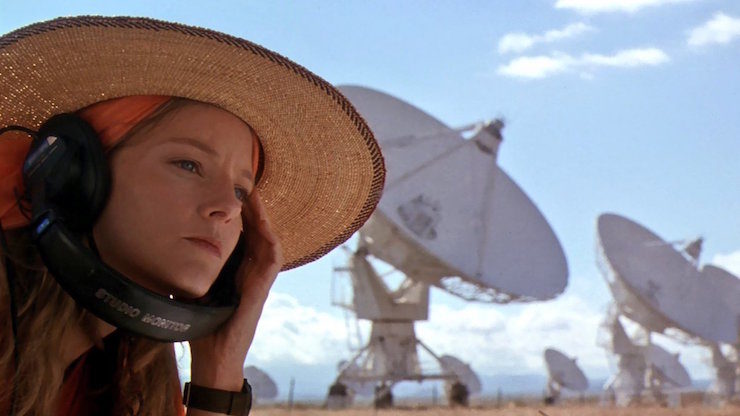You can have your Star Treks, your X-Files and your Expanses. I prefer my SF dramas on radio, partly because I was raised on CBC Radio, BBC World Service and CKMS1, and partly because (as Stan Freberg pointed out) radio’s visual effects are so convincing. We live in a golden age of online archives; many of the classic anthology-style science fiction shows are online. That said, not all radio shows are created equal.
Mutual Broadcasting System’s 2000 Plus (1950 – 1952), for example, is historically significant as the very first anthology-style SF radio. It’s not especially entertaining. The existing archives of CBS’s Beyond Tomorrow (1950), ABC’s Tales of Tomorrow (1953) and ABC’s World Security Workshop (1946 – 1947) are fragmentary or nonexistent.
The Mutual Broadcasting System’s Exploring Tomorrow (1957 – 1958) adapted stories from Astounding Magazine (now Analog Science Fiction and Fact). Astounding editor John W. Campbell served as its announcer, breaking into stories mid-broadcast to comment on the narratives. I found Campbell’s interruptions more distracting than illuminating, but if you’re an Astounding fan or just curious what Campbell sounded like, this is the show for you.
Stargazing in Canada can get you eaten by wolves but we’ve still produced some decent SF, and some of that has been on radio. CBC’s Nightfall (1980 – 1983) and Vanishing Point (1984 – 1991) both drew on published works (often from outside genre) and both had excellent production values. Nightfall was marred by some pretty off-putting misogyny, however, even taking into account the era it is from. Both were very, very Canadian, verging on self-parody; judging by the recurring tropes in Nightfall, the iconic Nightfall story would be one where a vacation in a small town ended with a Toronto woman’s murder at the hands of misguided scientists. While it snowed.
South Africa offered Michael McCabe’s SF 68 (1968), which featured adaptations of stories by authors like Ellison, Le Guin, and Bradbury. The production values were solid. I have no idea how McCabe secured rights for stories by authors I am pretty sure disapproved of Apartheid2. The ads were aimed at housewives, which makes me wonder about the demographics of 1960s-era South African SF fandom.
NPR’s Sci-Fi Radio (1989) only had 26 episodes. Producer Kevin Singer had a pretty good grasp of which magazine stories could be adapted to radio, so it’s a shame he didn’t have a longer run.
There are three shows that stand out over all the others:
WHA’s Mindwebs (1976-1984) was the most delightful surprise of my concerted forage for audio SF. I had no idea it existed and came across it more or less by accident. Helmed by Michael Hanson, it leaned more towards narration than the full cast dramatizations than I prefer. That said, the performances were top-notch. A generation more recent than most classic SF radio shows, it drew from a more contemporary selection of science fiction.
NBC’s Dimension X (1950-1951) and X Minus One (1955-1958) shared a network, some staff and initial source material for scripts. The first fifteen scripts for X Minus One were repurposed Dimension X scripts. Although the shows began by adapting stories from Astounding, X Minus One turned to more sophisticated material from Galaxy Magazine.
Although I was not even born when X Minus One went off the air, thanks to CBC’s habit of broadcasting cheap affordably priced material as filler valuable historical content during the summer, I knew that announcer Fred Collins’ intro—
Count down for blast-off. X minus five… four… three… two… X minus one… Fire!
From the far horizons of the unknown come transcribed tales of new dimensions in time and space. These are stories of the future, adventures in which you’ll live in a million could-be years on a thousand may-be worlds. The National Broadcasting Company in cooperation with Street & Smith, publishers of Astounding Science Fiction Magazine present:
X— X– x– x– MINUS— MINUS –Minus–minus– ONE–ONE– One–one…
—promised twenty-odd minutes of adventure (plus some fascinating ads). Having learned from my ongoing Because My Tears Are Delicious To You reviews that older SF often ages badly, I was bit hesitant to revisit this old favourite, but for the most part it withstood the test of time. I do wonder at the number of Madison Avenue-related stories.
While X Minus One had stronger material overall, Dimension X had what may be the single greatest ad lib in the history of broadcast science fiction. During their June 24, 1950 adaptation of Heinlein’s Destination Moon, immediately following an impassioned plea by one character for world government and global peace, an announcer broke in to inform listeners that North Korea had invaded South Korea. Underlining the need for world peace with a real-world conflict that could very easily have tipped over into a nuclear exchange? That’s the kind of dedication I wish more producers demonstrated.
1: “CKMS?” you ask, “What’s CKMS?” It was the University of Waterloo’s radio station, which broadcast with a magnificent however-many-watts two hamsters on a treadmill could generate. The significant thing about CKMS is that the radio serials it broadcast were the first works I encountered of Tor author James Alan Gardner, whose All Those Explosions Were Someone Else’s Fault is on sale now.
2: Listeners uncomfortable about listening to a product of Apartheid-era South Africa should do their best not to remember that almost all of the American shows mentioned herein emerged from Jim Crow-era USA. Not to mention what was going in Canada when Nightfall and Vanishing Point were on the air.
In the words of Wikipedia editor TexasAndroid, prolific book reviewer and perennial Darwin Award nominee James Davis Nicoll is of “questionable notability.” His work has appeared in Publishers Weekly and Romantic Times as well as on his own websites, James Nicoll Reviews and Young People Read Old SFF (where he is assisted by editor Karen Lofstrom and web person Adrienne L. Travis). He is surprisingly flammable.










